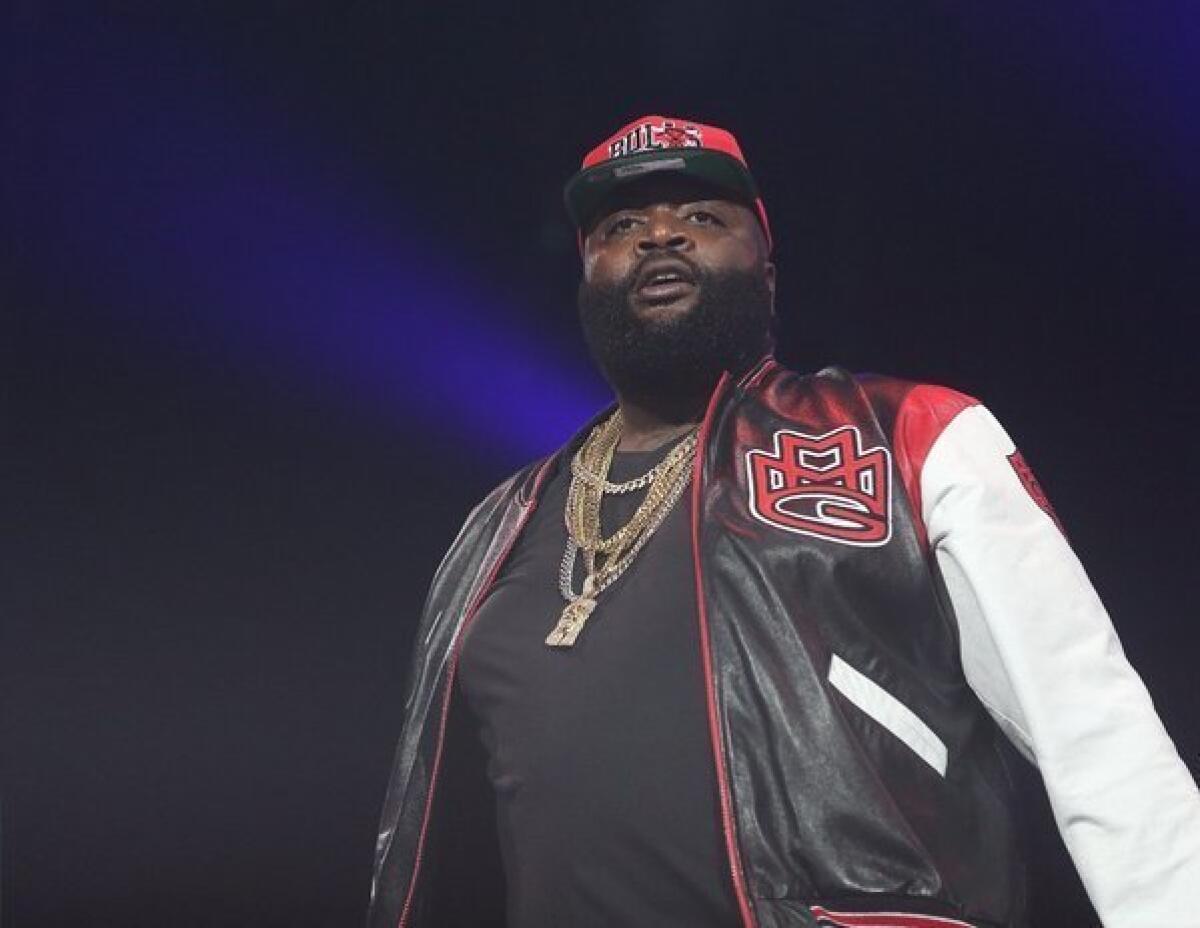Rick Ross apologizes for lyric ‘interpreted as rape’

- Share via
For the last week Rick Ross has been engulfed in a firestorm over recent lyrics that seemingly promote date rape.
Although the track, “U.O.E.N.O.” (a collaboration with Future and Atlanta emcee Rocko; warning: link contains profanity) has been out for more than a month – it’s lifted from Rocko’s latest mixtape – the largely forgettable song has started to gain traction from the masses due to Ross’ controversial guest verse.
“Put Molly all in her champagne/ She ain’t even know it/ I took her home and I enjoyed that/ She ain’t even know it,” he raps on the track.
Molly, for the unaware, is the powder or crystal form of pure MDMA, a substance typically found in Ecstasy. The drug is known for its ability to reduce inhibitions and provide feelings of euphoria, especially when the user is touched by another person.
Dropping the drug’s name, much like the codeine and promethazine concoction “sizzurp,” has become a common lyrical reference for a slew of rappers including Kanye West, Lil Wayne and 2 Chainz. But Ross drew the ire of listeners and critics in this instance, which seems to portray date rape as entertainment.
RELATED: In hip-hop, violence is taking on a diminishing role
Socially conscious rapper Talib Kweli blasted the self-proclaimed “Boss” as “a misguided 40-year-old person” and demanded he take responsibility over the lyric, and a number of organizations, including anti-sexism collective UltraViolet, have launched petitions to have the rapper-mogul dropped as a spokesman for Reebok. UltraViolet’s petition surpassed more than 72,000 signatures, the organization announced on Thursday.
Ross has brushed off the controversy as a simple “misunderstanding.”
“Woman is the most precious gift known to man, you understand,” he told a New Orleans radio station last week. “And there was a misunderstanding with a lyric, a misinterpretation where the term ‘rape’ wasn’t used. I would never use the term ‘rape,’ you know, in my records. And as far as my camp, hip-hop don’t condone that, the streets don’t condone that, nobody condones that.”
“I just wanted to reach out to all the queens that’s on my [Twitter] timeline, all the sexy ladies, the beautiful ladies that had been reaching out to me with the misunderstanding,” he continued. “We don’t condone rape and I’m not with that.”
He has yet to explain what he meant with the lyric. But Ross maintains since he didn’t say the term “rape” that listeners shouldn’t perceive his verse as an endorsement. He even took to Twitter on Thursday to apologize, not for the actual lyrics but for what’s been “interpreted as rape.”
“I dont condone rape. Apologies for the #lyric interpreted as rape. #BOSS,” he tweeted. Ross later directed a tweet toward Reebok and UltraViolet writing, “Apologies to my many business partners, who would never promote violence against women.”
The problem with Ross’ apology? He implies that the listener is to blame for interpreting his words incorrectly. But it begs to ask the question, how else could the lyric be interpreted?
Take a look at the line again: “Put Molly all in her champagne/ She ain’t even know it/ I took her home and I enjoyed that/ She ain’t even know it.” Just to clarify Ross’ viewpoint, slipping a drug into a woman’s drink, and taking her home to take advantage of her intoxicated or unconscious condition isn’t rape simply because the actual word wasn’t used?
Hip-hop, more than any genre, has long held a polarizing role in society with lyrics that have been routinely criticized for depicting violence and sexualization of women. Ross’ controversy isn’t the first time a rapper’s lyrics were called into question, and it certainly won’t be the last.
Lil Wayne was recently in a similar hotseat after he name-dropped slain civil rights figure Emmett Till in a vulgar sexual reference on a remix to Future’s “Karate Chop.” Epic Records chairman Antonio “L.A.” Reid apologized to Till’s family and had the song pulled.
Ross, in his radio interview, said he believed rappers have a responsibility to clarify their lyrics. “I feel like us being artists that’s our job,” he said. “To clarify the sensitive things and the things that we know that really need to be clarified such as a situation as this.”
After Ross’ tweet on Thursday, UltraViolet protested outside Reebok’s flagship store in New York City and presented store representatives with the boxes containing the petitions.
“It’s time for Reebok to stop using their brand as a platform to promote rape and the idea that rape is not just okay, but cool. Contrary to Ross’ claims, there was no misinterpretation here: Slipping a woman a drug and ‘enjoying that’ is rape, plain and simple.” Nita Chaudhary, co-founder of UltraViolet, said in a statement.
PHOTOS AND MORE
COACHELLA 2013: Full coverage
THE ENVELOPE: Awards Insider
PHOTOS: Grammy top winners
More to Read
The biggest entertainment stories
Get our big stories about Hollywood, film, television, music, arts, culture and more right in your inbox as soon as they publish.
You may occasionally receive promotional content from the Los Angeles Times.











